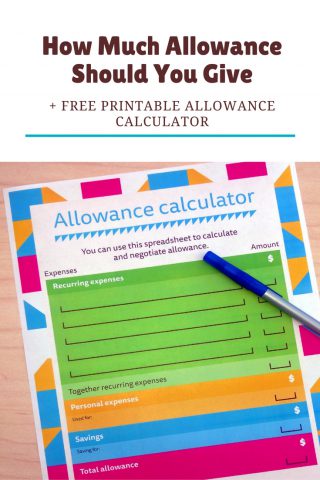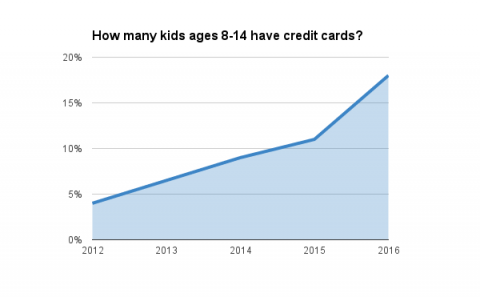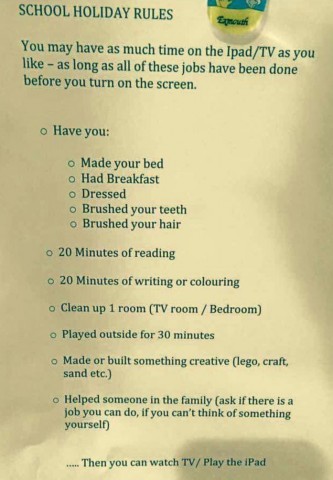Blog
Should I Keep an Emergency Fund for My Teen?
 Sometimes, teens get in trouble. In many cases, that trouble is taken care of in a manner that’s quiet and relatively simple. In other cases, the trouble a teen causes will interact with the adult world. Teens can be involved in legal issues that require them to be bailed out – and that job falls to the parents.
Sometimes, teens get in trouble. In many cases, that trouble is taken care of in a manner that’s quiet and relatively simple. In other cases, the trouble a teen causes will interact with the adult world. Teens can be involved in legal issues that require them to be bailed out – and that job falls to the parents.
How to Stop Sibling Rivalry with Chores
 Parents of multiple children will understand the concept of sibling rivalry when it comes to chores. Perhaps your kids are arguing over their younger sister being able to do less of a chore while they are stuck shovelling the pet mess on the front yard. Other times your younger kids are upset that they can’t do the big kid chores and so on and so forth. Sibling rivalry is a given when it comes to raising more than one child and yes, it often occurs over chores. Kids don’t think they are all that fun (How is that possible?), they feel you’re definitely not being fair, and want to do precisely that “easy and super-fun” chore that you so unfairly assigned to their sibling – again!
Parents of multiple children will understand the concept of sibling rivalry when it comes to chores. Perhaps your kids are arguing over their younger sister being able to do less of a chore while they are stuck shovelling the pet mess on the front yard. Other times your younger kids are upset that they can’t do the big kid chores and so on and so forth. Sibling rivalry is a given when it comes to raising more than one child and yes, it often occurs over chores. Kids don’t think they are all that fun (How is that possible?), they feel you’re definitely not being fair, and want to do precisely that “easy and super-fun” chore that you so unfairly assigned to their sibling – again!
4 Ways to Teach Kids about Smart Spending
 As parents it’s our job to teach our kids about financial responsibility. This means that you shouldn’t feel guilty for not buying junior that much desired video game or little Lilly that doll she’s been begging for. Even if you are a parent who makes enough money for those extras, it’s good to handle a little restraint. Kids are forever watching their parents. Kids comprehend more than parents give them credit for. As you work to practice smart spending habits, the kids will pick up some of those habits.
As parents it’s our job to teach our kids about financial responsibility. This means that you shouldn’t feel guilty for not buying junior that much desired video game or little Lilly that doll she’s been begging for. Even if you are a parent who makes enough money for those extras, it’s good to handle a little restraint. Kids are forever watching their parents. Kids comprehend more than parents give them credit for. As you work to practice smart spending habits, the kids will pick up some of those habits.
What is your chore doing style?
 A while back we were talking about how different people and families tackle chores. How some people find doing laundry relaxing and some dread the though of it. How some people sing and dance with the vacuum and how some find pleasure in manically scrubbing the bathtub. And especially how some want to see their entire family cleaning with them the whole Saturday evening and some just send everyone out so they can get the work really done.
A while back we were talking about how different people and families tackle chores. How some people find doing laundry relaxing and some dread the though of it. How some people sing and dance with the vacuum and how some find pleasure in manically scrubbing the bathtub. And especially how some want to see their entire family cleaning with them the whole Saturday evening and some just send everyone out so they can get the work really done.
So we came up with a scientific method of determining your chore doing style. It is 100% accurate and the results will help you navigate chores better. If you want to find out whether you belong among neat-freaks or total slobs, this fun quiz will help you learn exactly where you stand on the chore-doing spectre and it will also equip you with some tips on how to be more productive according to your personality.
How much allowance should you give

While allowance is by no means a child’s right, it definitely is one of the best ways to teach children how to handle their finances. Kids need to learn the basics of money: where it comes from, how it should be spent and saved, and most importantly – that the resources are limited.
This is especially important now, when a lot of our own purchases are done online and kids don’t get to see money exchanging hands. It is easy to miss the facts that things cost money – even if we buy them online or with a credit card – which can cause financial troubles in their future.
How to teach kids to save money

A couple of years back, when I visited the store with my youngest, he would often wander into the toy aisle to look at newest and biggest toys in the colourful packages. He quickly learned that we don’t buy toys every time we visit the store, but sometimes he found a toy he just needed to have. He knew he can sometimes get something and the pleading began. The funny thing is that while some toys he wished for were indeed expensive, some were dirt cheap! Children often have no concept of the value of money beyond that we exchange it for goods.
Orpheum Challenge Winners
This Sum mer The Orpheum Theatre and Homey decided to reward Memphis families with tickets for the first three shows in Orpheum’s 2016-2017 Family Series.
mer The Orpheum Theatre and Homey decided to reward Memphis families with tickets for the first three shows in Orpheum’s 2016-2017 Family Series.
While 93 families in the Memphis area entered the challenge, the raffle picked among those who did enough chores to complete the challenge and decided on four winners, who will get to see the shows for free.
When are parents giving their kids credit cards?

Although banks won’t approve credit cards for kids under the age of 18, a lot of kids now have and use credit cards as the authorised users on their parents accounts.
A 2016 Parents, Kids & Money survey conducted by T. Rowe Price revealed that 18% of children ages 8-14 now have access to credit cards, even if as much as 66% of parents believe kids should be at least 15 to get access to their first credit card. The number of kids with credit cards has actually more than quadrupled in the last four years!
Homey, It’s Time for Chores!
 Today, we are featuring a guest post by Carissa Howard, a lawyer turned stay-at-home mom, who created a website, Shopping for Time, a resource for busy people, dedicated to time in all its various forms: time management, time savers, efficiency, and quality personal and family time.
Today, we are featuring a guest post by Carissa Howard, a lawyer turned stay-at-home mom, who created a website, Shopping for Time, a resource for busy people, dedicated to time in all its various forms: time management, time savers, efficiency, and quality personal and family time.
“I wish there were more hours in the day.” I hear this all the time.
Time. We all want more of it. Time to be with our families, our kids, our friends, time to work, time to sleep, time to exercise, time for a house project. Just more time.
6 apps for kids who love animals

As parents we might try to limit our children’s access to screens, but I know it is not always that easy. What we can do is make sure we provide them with educational apps, that will also keep them entertained for hours. Finding great quality apps can be hard, especially next to a busy schedule and always bored kids asking to play mindless games on the tablet. And since our kids are in the phase where they want to know everything about every possible animal on the planet, I created this list of apps that can help kids spend some time on their mobile devices and learn at the same time.
